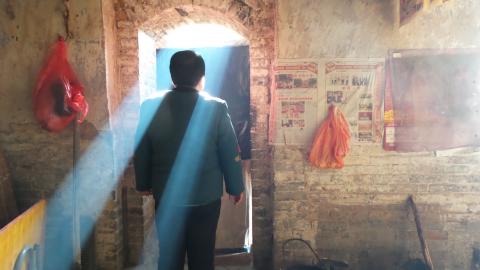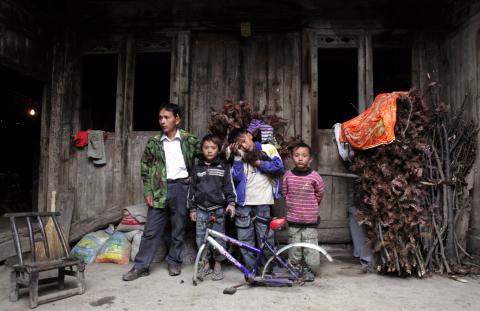They’ve explored money, dreams, education and trust in past years, and starting today, the ninth edition of CNEX’s Documentary Film Festival will be taking a look at the Internet and its effect on the world.
Every year, CNEX, a nonprofit founded by documentary enthusiasts from Taiwan, China and Hong Kong, calls for film proposals from young or aspiring directors of Chinese descent based on an annual theme and helps them develop and produce the final piece.
The festival then draws from CNEX’s theme from the previous year so that selected finished productions can be screened alongside international offerings exploring related topics. All 21 films shown this year will be making their Taiwan premieres, and the five house films will make their first world showing.

Photo courtesy of CNEX
The flagship piece for the festival is foreveryone.net by American director Jessica Yu (虞琳敏). It tells the story of Tim Berners-Lee, the man who invented the World Wide Web and decided to make it free to the public.
“If I had to recommend one film to watch first, this would be it because it’s like a general introduction to our entire festival,” says the festival’s Andre Wu (吳定翰).
Another film Wu recommends is Song of Lahore, which depicts a group of classical musicians trying to preserve their traditional craft under Taliban rule. They decide to use Pakistani instruments to reprise jazz standards, and unexpectedly become an international sensation through YouTube.

Photo courtesy of CNEX
The third film Wu suggests is another CNEX production, Look Love (對看), which examines two Chinese families from opposite ends of the economic ladder who, for different reasons, send their children away to attend school.
The programming is divided into four sections. Virtual Empire looks at the possibilities and generally positive effects of the Internet, while Part of the Digital Game explores the bad and ugly such as privacy, piracy and the controversy behind drone technology.
The third, War and Peace, Offline, examines the struggles people face outside of the Internet, and the last, In Love We Unite looks at now technology has changed human relationships and the way we connect with each other.

Photo courtesy of CNEX
Wu adds that in accordance to the Internet theme, the festival has also been screening films online and on CNEX’s multimedia-on-demand (MOD) channel since the beginning of this month. The remaining screenings are tomorrow and Sept. 30 at 9:30pm.
With such a large international offering, how does the festival fulfill its mission statement of “guiding the viewers to reflect on the changes the Internet has brought to ethnic Chinese society?”
“I think we can compare and contrast with the stories and cases from other countries,” Wu says. “The Internet is already an international phenomenon. We are living in the same virtual environment and there should be plenty of parallels.”

Photo courtesy of CNEX

May 11 to May 18 The original Taichung Railway Station was long thought to have been completely razed. Opening on May 15, 1905, the one-story wooden structure soon outgrew its purpose and was replaced in 1917 by a grandiose, Western-style station. During construction on the third-generation station in 2017, workers discovered the service pit for the original station’s locomotive depot. A year later, a small wooden building on site was determined by historians to be the first stationmaster’s office, built around 1908. With these findings, the Taichung Railway Station Cultural Park now boasts that it has

The latest Formosa poll released at the end of last month shows confidence in President William Lai (賴清德) plunged 8.1 percent, while satisfaction with the Lai administration fared worse with a drop of 8.5 percent. Those lacking confidence in Lai jumped by 6 percent and dissatisfaction in his administration spiked up 6.7 percent. Confidence in Lai is still strong at 48.6 percent, compared to 43 percent lacking confidence — but this is his worst result overall since he took office. For the first time, dissatisfaction with his administration surpassed satisfaction, 47.3 to 47.1 percent. Though statistically a tie, for most

Six weeks before I embarked on a research mission in Kyoto, I was sitting alone at a bar counter in Melbourne. Next to me, a woman was bragging loudly to a friend: She, too, was heading to Kyoto, I quickly discerned. Except her trip was in four months. And she’d just pulled an all-nighter booking restaurant reservations. As I snooped on the conversation, I broke out in a sweat, panicking because I’d yet to secure a single table. Then I remembered: Eating well in Japan is absolutely not something to lose sleep over. It’s true that the best-known institutions book up faster

In February of this year the Taipei Times reported on the visit of Lienchiang County Commissioner Wang Chung-ming (王忠銘) of the Chinese Nationalist Party (KMT) and a delegation to a lantern festival in Fuzhou’s Mawei District in Fujian Province. “Today, Mawei and Matsu jointly marked the lantern festival,” Wang was quoted as saying, adding that both sides “being of one people,” is a cause for joy. Wang was passing around a common claim of officials of the People’s Republic of China (PRC) and the PRC’s allies and supporters in Taiwan — KMT and the Taiwan People’s Party — and elsewhere: Taiwan and